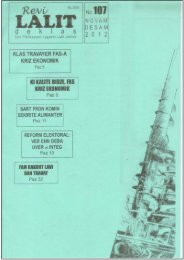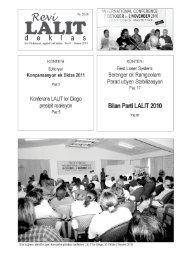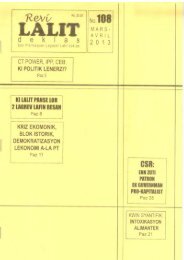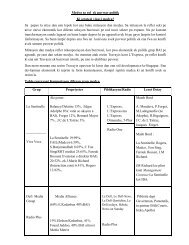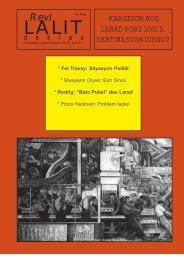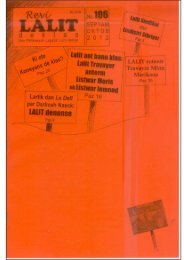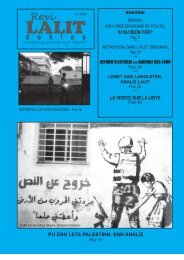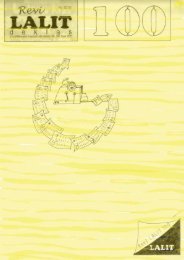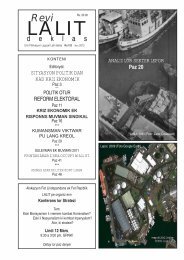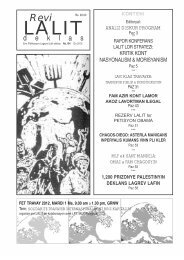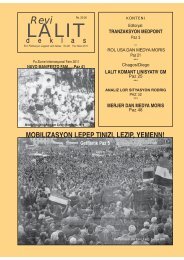Against communalism of the best-loser system - Lalit Mauritius
Against communalism of the best-loser system - Lalit Mauritius
Against communalism of the best-loser system - Lalit Mauritius
Create successful ePaper yourself
Turn your PDF publications into a flip-book with our unique Google optimized e-Paper software.
But a good political <strong>system</strong>, <strong>of</strong> course, aims to represent different political opinions not just<br />
different categories <strong>of</strong> people.<br />
But, back to <strong>the</strong> question <strong>of</strong> “way <strong>of</strong> life”; in <strong>Mauritius</strong>, “way <strong>of</strong> life” has for <strong>the</strong> past 30 years<br />
been assumed to mean a clump <strong>of</strong> some ra<strong>the</strong>r ill-defined prejudices, ga<strong>the</strong>ring around name,<br />
religion, and race.<br />
In <strong>the</strong> Constitution <strong>of</strong> <strong>Mauritius</strong>, it is assumed that a candidate for general elections can<br />
somehow know that he or she is or is not a member <strong>of</strong> a “H….,” “M….”, or “S-M….”<br />
community by his or her way <strong>of</strong> life.<br />
The state itself, it should be noted, has – thank goodness – since 1968 only classified people in<br />
one Census (1972) and even <strong>the</strong>n this classification was – again, thank goodness – confidential<br />
information <strong>of</strong> <strong>the</strong> Central Statistical Office, and used as a statistic.<br />
Subsequently, in 1982, <strong>the</strong> state actually took a decision, performed a positive act, and placed<br />
this act into a Constitutional Amendment, i.e. that <strong>the</strong> state would no longer continue with <strong>the</strong><br />
practice <strong>of</strong> classifying people into <strong>the</strong>se four or any o<strong>the</strong>r so-called “communities”, but would<br />
make do with <strong>the</strong> 1972 Census figures instead.<br />
But until when?<br />
What’s in a Name?<br />
One might think that a surname is a useful indicator <strong>of</strong> “way <strong>of</strong> life”. But this is where pure<br />
prejudice again comes into it. I think it would be safe to say that <strong>the</strong>re is not a single surname in<br />
<strong>Mauritius</strong> which is unique to any ONE so-called community, nor was <strong>the</strong>re such a surname even<br />
at <strong>the</strong> time that <strong>the</strong> government did <strong>the</strong> last Census in 1972.<br />
Mr. Carrimkhan in his affidavit did no more than submit <strong>the</strong> names <strong>of</strong> people, <strong>the</strong>ir membership<br />
<strong>of</strong> parties, and <strong>the</strong>ir “membership <strong>of</strong> communites” as filled in on <strong>the</strong>ir Nomination Papers. Thus<br />
“name” <strong>of</strong> a candidate was used as a “prima facie” case. Then, later on, Mr. Mohammed<br />
proceeded to demolish his own prima facie case. In <strong>the</strong> witness box, Mr Mohamed’s client, Mr.<br />
Carrimkhan, only ever referred to two “communities” that he thought two different candidates<br />
should be re-classified into. His case was very weak. He said he knew that Ms. Minerve (from<br />
her name) was “a Cr….” and proceeded to refer to a form <strong>of</strong> classification not used in <strong>the</strong><br />
Constitution, and Mr. Anenden (from his name) was “a M….s” And proceeded to refer to yet<br />
ano<strong>the</strong>r form <strong>of</strong> classification not used in <strong>the</strong> Constitution. One can only wonder how Mr.<br />
Carrimkhan could manage to bring this case without even knowing <strong>the</strong> four communities that<br />
<strong>the</strong> Constitution requires candidates to fill in. The mind boggles.<br />
Yousouf Mohamed saw Maulana Haroon scoring a third own goal. He said that in his opinion<br />
Ahmadiya people may have names that are Muslim-sounding names but that <strong>the</strong>y are not, in his<br />
opinion, members <strong>of</strong> “<strong>the</strong> Muslim community”. So names are clearly problematic. And this is<br />
just one small example <strong>of</strong> <strong>the</strong> difficulty <strong>of</strong> using names as indicators <strong>of</strong> being members <strong>of</strong> <strong>the</strong><br />
community.<br />
This is true even <strong>of</strong> “given names”, first names. These “first names” are not only quite difficult<br />
to classify with any certainty, but fashions change in child-naming. Many first names now quite<br />
fashionable have never been used before in <strong>Mauritius</strong>, and are <strong>the</strong>refore unknown. No judge can<br />
be expected to know which names are “M…. names” and not “Jewish names” and thus “general<br />
population names”, for example. Nor can a judge be expected to know which names are “H…”<br />
and not “Jain names”, and <strong>the</strong>refore “general population names”. Nor can a judge know which<br />
names are “S...M…names” and not, say, “Vietnamese and thus “general population names.” In<br />
evidence, huge books <strong>of</strong> names would need to be produced in order to prove that such-and-such<br />
a name was, let us say, a “H… name” and NOT a “M… name” in any part <strong>of</strong> <strong>the</strong> world. And<br />
<strong>the</strong>re is, in any case, no way that <strong>the</strong> name one’s parents choose to give one soon after birth can<br />
be used as an indicator <strong>of</strong> one’s adult “way <strong>of</strong> life”, so <strong>the</strong> exercise would be quite futile. It is<br />
plainly absurd.<br />
And while we are on names, let us look at some <strong>of</strong> <strong>the</strong> five candidates that Yousouf Mohammed<br />
and his client did not challenge. One <strong>of</strong> our candidates is called Georges Legallant. He filled in<br />
<strong>the</strong> Nomination Paper after drawing lots with his community specified as “M…” He was not<br />
challenged on <strong>the</strong> grounds <strong>of</strong> his name presenting a prima facie case. Doris Ah-Vee, who had<br />
filled in G…. P…., was also not challenged. Curiously, Ram Seegobin was challenged for being<br />
“G…. P….” while his wife (who is me, and I can assure you we have <strong>the</strong> same way <strong>of</strong> life) was<br />
not challenged.



